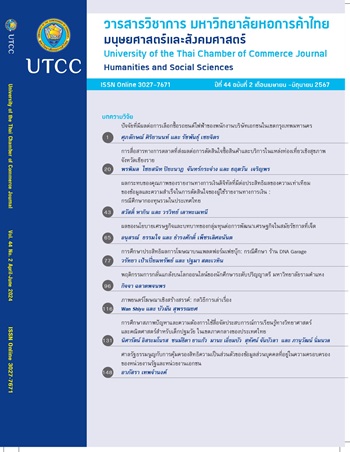Factors Affecting Electric Vehicle Buying Decision of Private Company Employees in Bangkok
Main Article Content
Abstract
This study aims to: 1) investigate the factors influencing the purchase decision of electric vehicles (EVs) among private company employees in Bangkok, and 2) evaluate the cost-effectiveness of EV ownership for these consumers. Data was collected by calculating the Total Cost of Ownership (TCO) of internal combustion engine (ICE) vehicles, which includes the purchase price, fuel costs, maintenance expenses, leasing interest rates, depreciation rates, insurance premiums, and annual vehicle taxes. The relationship between independent and dependent variables was analyzed using Multiple Regression Analysis with the Ordinary Least Square Method (OLS), in conjunction with data gathered from questionnaires. The sample group comprised 200 employees of private companies in Bangkok and Metropolitan Region. Statistical measures employed in this research include mean and standard deviation.
The study's findings indicate that when comparing TCOs of EVs with similar purchase prices, the overall ownership costs are either comparable or show negligible differences. Moreover, the analysis of opinions on factors affecting the decision to purchase an EV reveals an average overall opinion score of 5.6969. Upon examining individual aspects, the highest average score pertains to government policies, followed by purchase intention, adherence to reference groups, and societal image influence, respectively.
Article Details

This work is licensed under a Creative Commons Attribution-NonCommercial-NoDerivatives 4.0 International License.
ลิขสิทธิ์ของบทความ
ผลงานที่ได้รับการตีพิมพ์ถือเป็นลิขสิทธิ์ของมหาวิทยาลัยหอการค้าไทย ห้ามมิให้นำเนื้อหา ทัศนะ หรือข้อคิดเห็นใด ๆ ของผลงานไปทำซ้ำ ดัดแปลง หรือเผยแพร่ ไม่ว่าทั้งหมดหรือบางส่วนโดยไม่ได้รับอนุญาตเป็นลายลักษณ์อักษรจากมหาวิทยาลัยหอการค้าไทยก่อน
References
Autolifethailand.tv.(2024) .Electric vehicle registration 100% in Thailand in 2023, totaling 76,314 vehicles (+684.4%) from last year | BYD Atto 3 Part. https://autolifethailand.tv/total-ev-bev-register-2023-thailand/ [in Thai]
Chantana Wankhanit. (2020). FACTORS AFFECTING THE DECISION TO PURCHASE ELECTRIC CARS OF THE GENERATION Y. (Unpublished master’s independent study). Mahidol University, Nakhon Pathom. [in Thai]
Department of Land Transport, Planning Division Group, Transportation Statistics, (2022).Transportation statistics report. https://web.dlt.go.th/statistics/ [in Thai]
Ilada Thammasang. (2019). FACTORS AFFECTING DECISION TO USE ELECTRIC VEHICLES OF PEOPLE IN CHONBURI PROVINCE. (Unpublished master’s independent study).Ramkhamhaeng University, Bangkok. [in Thai]
Siripotjanakul, C. (2016). The assessment of total cost of ownership of electric vehicle in Bangkok [Unpublished master’s independent study]. Thammasat University. [in Thai]
Smartgrid Thailand. (2022). Number and location of EV charging stations in Thailand. https://thai-smartgrid.com/%E0%B8%88%E0%B8%B3%E0%B8%99%E0%B8%A7%E0%B8%99%E0%B9%80%E0%B9%80%E0%B8%A5%E0%B8%B0%E0%B8%95%E0%B8%B3%E0%B9%80%E0%B9%80%E0%B8%AB%E0%B8%99%E0%B9%88%E0%B8%87%E0%B8%AA%E0%B8%96%E0%B8%B2%E0%B8%99%E0%B8%B5/ [in Thai]
Social Security Office. (2020). Number of compulsory insured persons (Section 33) year 2020. https://catalog.sso.go.th/dataset/dataset-24_04/resource/cd7f3199-522b-420f-9aaa-2c4f1d78ca77/ [in Thai]
Witsarut Tangphet. (2017). FACTORS AFFECTING CONSUMER’S BATTERY ELECTRIC VEHICLE PURCHASE INTENTION FOR GEN X AND GEN Y IN BANGKOK. (Unpublished master’s independent study). Thammasat University, Pathum Thani. [in Thai]
Ardagna, D., & Francalanci, C. (2005). A cost-oriented approach for the design of IT architectures. Journal of Information Technology, 20(1), 32-51. doi:10.1057/palgrave.jit.2000032
Kotler, P. (2003). Marketing management (11th ed.). Prentice-Hall.
Kotler, P., & Armstrong, G. (2000). Principles of marketing (9th ed). Prentice-Hall.
Bubeck, S., Tomaschek, J., & Fahl, U. (2016). Perspectives of electric mobility: Total cost of ownership of electric vehicles in Germany. Transport Policy, 50, 63-77. doi:https://doi.org/10.1016/j.tranpol.2016.05.012
Breetz, H. L., & Salon, D. (2018). Do electric vehicles need subsidies? Ownership costs for conventional, hybrid, and electric vehicles in 14 U.S. cities. Energy Policy, 120, 238-249. doi:https://doi.org/10.1016/j.enpol.2018.05.038
Ellram, L. M. (1995). Total cost of ownership: An analysis approach for purchasing. International Journal of Physical Distribution & Logistics Management, 25(8), 4-23. doi:10.1108/09600039510099928
George, D., & Mallery, P. (2003). SPSS for windows step by step: A simple guide and Reference, 11.0 update (4th ed.). Allyn & Bacon.
Harvey, L. D. D. (2018). Cost and energy performance of advanced light duty vehicles: Implications for standards and subsidies. Energy Policy, 114, 1-12. doi:https://doi.org/10.1016/j.enpol.2017.11.063
Pavlenko, N., Slowik, P., & Lutsey, N. (2019). When does electrifying shared mobility make Economic sense? (The International Council of Clean Transportation Working Paper 2019-01). https://theicct.org/wp-content/uploads/2021/06/Electric_shared_mobility
_20190114.pdf
van Vliet, O., Brouwer, A. S., Kuramochi, T., van den Broek, M., & Faaij, A. (2011). Energy use, cost and CO2 emissions of electric cars. Journal of Power Sources, 196(4), 2298-2310. doi:https://doi.org/10.1016/j.jpowsour.2010.09.119
Wu, G., Inderbitzin, A., & Bening, C. (2015). Total cost of ownership of electric vehicles compared to conventional vehicles: A probabilistic analysis and projection across market segments. Energy Policy, 80, 196-214. doi:https://doi.org/10.1016/j.enpol.2015.02.004
Yamane, T. (1973) Statistics: An Introductory Analysis. 3rd Edition, Harper & Row Ltd., New York.


